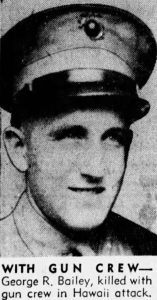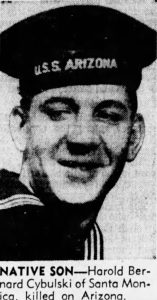Edward Merle Barry from Santa Monica, California, Los Angeles county.
Service era: Korea
Date of death: Thursday, November 2, 1950
Death details: During the last week of October 1950, Republic of Korea (ROK) Army forces under the control of the U.S. Eighth Army were advancing deep in North Korean territory, approaching the Yalu River on the Chinese-Korean border. Chinese Communist Forces (CCF) struck back in a surprise attack, engaging the ROK 1st and 6th Divisions near Unsan, some sixty miles north of Pyongyang. The U.S. 1st Cavalry Division, with the 8th Cavalry Regiment in the lead, was rushed forward to reinforce the ROK units in the Unsan area. On November 1, the regiment’s 1st Battalion took up positions north of Unsan, while the 2nd Battalion moved to guard the Nammyon River valley west of town, and the 3rd Battalion was placed in reserve at the valley’s southern end. Sergeant Edward Merle Barry, who joined the U.S. Army from California, was a member of Headquarters and Headquarters Battery, 99th Field Artillery Battalion, 1st Cavalry Division. On November 1, 1950, various 1st Cavalry Division units were engaged in defending offensive positions against encroaching CCF in the Unsan area when they were ordered to withdraw after receiving intense rocket and mortar attacks. Withdrawing troops fought their way through Unsan, which by then thoroughly was infiltrated with Chinese forces who engaged intense small arms fire from rooftops and behind roadblocks. On November 2, Sergeant Barry went missing while members of his unit were attempting to make it to Ipsok on foot. One of the POW returnees from this battle reported he had seen SGT Barry with a severe head wound on November 5, an hour before both were captured south of Unsan. Another former POW said SGT Barry was blinded and died soon after capture, so he may have been a POW for a short time. Sergeant Barry’s remains have not been recovered, and he could not be associated with any of the remains that North Korean officials returned to U.S. custody after the armistice. Today, Sergeant Barry is memorialized on the Courts of the Missing at the National Memorial Cemetery of the Pacific.
Source: National Archives, Defense POW/MIA Accounting Agency, Los Angeles Times (1950)


